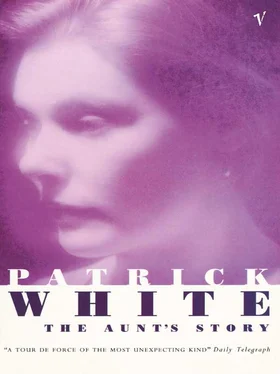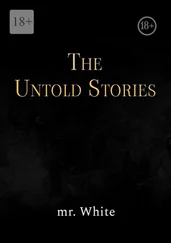‘And the Countess, and Wetherby?’ said the Demoiselles Bloch. ‘And General Sokolnikov? It is a tragedy of which one reads in the papers.’
‘I doubt whether Wetherby and Lieselotte are alive,’ Theodora said.
Because fevers consume, or are consumed. Nor did she expect Monsieur Durand, le petit , or Henriette. They too must have destroyed each other. But Sokolnikov, she said, there are some lives.
‘Yes, I am here, Ludmilla,’ said Sokolnikov, blowing like the sprays of several hoses. ‘I have escaped. That is, a few minutes earlier I was delivered by a miracle from a horrible and tragic death. Let us praise your saints. It reminds me a little of the occasion at Dvinsk when the barracks caught fire. Afterwards, at an inquiry, it was established that it was arson. The occasion at Dvinsk was as impressive, if also more emotional, on account of the number of horses which were roasted alive. The screaming of burning horses was heard by the peasants of a village several versts away. It even became the source of a local proverb: When horses scream at night, look to your kvass .’
Sokolnikov mopped his head. His spectacles were brilliant with excitement.
‘It was no miracle, ‘Alyosha Sergei,’ said Theodora, ‘that you failed to burn.’ Her affection could not have allowed it.
‘What is it you are muttering, Ludmilla?’ shouted Sokolnikov. ‘I wish you would explain.’
At most, he would evaporate in a great, hot cloud.
‘It is nothing,’ she said.
Not even a cloud. Sokolnikov was deathless. She could not explain.
She could not explain the certainties, even in the fierce mouths of fire.
‘ Mais dites ,’ the crowd said, ‘ il n’y a pas d’amants là-dedans, qui meurent enlacés sur un grand lit de fer ?’
‘There is still Katina Pavlou,’ whimpered Miss Grigg.
‘But here she is,’ said Theodora, with the certainty of certainty that fire will open.
‘ Ahhh, regardez ,’ sighed the crowd. ‘ Une jeune fillel Elle a perdu son fiancé? Où est sa mère ?’
‘The Lord be praised!’ cried Miss Grigg. ‘What are they saying about ’er mother? Madame Pavlou is at Evian les Bains.’
They were watching Katina Pavlou walk out of the burning house. She walked with her hands outstretched, protecting herself with her hands, not so much from substance, as some other fire. She could not yet accept the faces. As if these had read a reported incident, of which, she knew, the details had been inevitably falsified. But Katina Pavlou had seen the face of fire.
‘Thank you, Grigg,’ she said, receiving the shawl, because it was easier to.
Miss Grigg was all psalms and angora. She put, and touched. She touched again.
It was essential to wrap up tight, the Demoiselles Bloch advised, on account of the night air, it was essential for the poitrine .
But for the crowd it was essential that the roof should fall. It waited for this intensification of its lives.
‘Miss Goodman,’ said Katina Pavlou, ‘have you ever seen a burning piano?’
Theodora had not, but she had watched other moments writhe, distorted by less than fire.
‘Let us go somewhere else,’ she said because it was exhausting.
The Hôtel du Midi was now a set piece of fire. Theodora Goodman and Katina Pavlou went round to the back, pressing close to the wall of the confiserie . They sat on a bench in the jardin exotique , where a slight dew had fallen, in spite of events. Katina Pavlou took Theodora Goodman’s hand.
‘I shall go away,’ Katina Pavlou said, touching the bones in Theodora’s hand. ‘I shall go to my own country. Now I know. I shall go.’
‘But how?’ Theodora asked, remembering the revolving doors of many-starred hotels.
‘Why, but I am at liberty,’ said Katina Pavlou. ‘Aren’t I?’
Theodora considered the phases of the fire.
‘Why, yes, I suppose,’ Theodora smiled.
‘I shall take some money and some food,’ Katina Pavlou said. ‘Tomorrow you shall come with me to the station, Miss Goodman, and I shall buy the ticket.’
It was easy as this. Already Katina Pavlou sat in the train, eating the chocolate and the petits pains. The mountains flowed.
‘Yes, my dear Katina,’ Theodora sighed.
Already, from her corner, Katina Pavlou watched the slow smoke rise from white houses and sleepily finger the dawn. She sat upright, to arrive, to recover the lost reality of childhood. Her eyes were strained by sleeplessness.
‘Yes, Katina,’ Theodora said.
There was no reason to suppose that this was not the sequence of events. Theodora contemplated the fire eating the feeble fretwork of a gable, turning it to fierce lace.
Then the crowd began to call. The roof would fall, called the crowd. It was time, time, time. The voice thickened.
‘ Ahhhh ,’ cried the crowd in a last desperate spasm of consummation.
Theodora was glad that she did not see the faces flame.
‘I shall not look any more,’ Katina Pavlou said.
There was blood on her face. It had dried. It glittered, rather like new paint, or a murder on the stage.
‘And what shall you do, Miss Goodman?’ Katina Pavlou shivered.
‘I? I shall go now,’ Theodora said. ‘I shall go too.’
She touched the smooth, cold skin of a leaf of aloe.
‘Where?’ Katina Pavlou asked.
‘I have not thought yet,’ Theodora said.
The forms of the jardin exotique remained stiff and still, though on one edge, where they had pressed against the side of the Hôtel du Midi, they were black and withered. Their zinc had run into a fresh hatefulness.
‘But I shall go,’ Theodora said, indifferent to any pricking pressure, any dictatorship of the jardin exotique
Katina Pavlou yawned. Her face was rounding into sleep.
‘I may even return to Abyssinia,’ Theodora said.
After the metal hieroglyphs she felt an immeasurable longing to read the expression on the flat yellow face of stone. If the biscuit houses still existed.
‘You will go where? ’ Katina Pavlou asked.
‘Come, Katina, you are almost asleep,’ Theodora Goodman said. ‘We must join the others. Listen. They are calling us.’
When your life is most real, to me you are mad.
OLIVE SCHREINER
ALL through the middle of America there was a trumpeting of corn. Its full, yellow, tremendous notes pressed close to the swelling sky. There were whole acres of time in which the yellow corn blared as if for a judgement. It had taken up and swallowed all other themes, whether belting iron, or subtler, insinuating steel, or the frail human reed. Inside the movement of corn the train complained. The train complained of the frustration of distance, that resists, that resists. Distance trumpeted with corn.
Theodora Goodman sat beside the window in the train. Her hands were open. She had been carrying a weight, and now she was exhausted, slack, from receiving full measure, a measure of corn. Against her head the white mat gave her face a longer, paler, yellow shape. Like a corn cob. But in spite of outer appearances, Theodora Goodman suggested that she had retreated into her own distance and did not intend to come out.
This distressed the man in the laundered shirt, who wished to tell about his home, his mother, his cocktail cabinet, the vacation he had taken in Bermuda, and how he had sold papers as a boy. He sat in a corner, opposite Theodora Goodman, and felt and looked nervous, and fingered his mentholed chin, and rustled cellophane.
Or he talked, and heard his own voice made small.
Читать дальше












